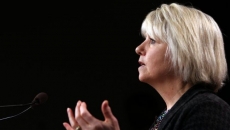The federal government recorded a budgetary deficit of $8.2 billion between April and September, $3.9 billion of which was in September.
Our economic plan is about building a strong economy that works for everyone, and this #FES2023 is the next phase of our plan. With a focus on supporting the middle class and building more homes, faster, we are taking action on the priorities that matter most to Canadians. pic.twitter.com/Wkh8R5CWDk
— Chrystia Freeland (@cafreeland) November 21, 2023
The finance department says in its monthly fiscal monitor that the deficit between April and September compared to a surplus of $1.7 billion during the same period last year.
Government revenues increased by $3.5 billion, or 1.7 per cent, a reflection of higher higher interest revenues and other non-tax revenues.
Program expenses excluding net actuarial losses were up $8.9 billion, or 4.8 per cent, from the same period a year earlier.
Public debt charges were up $5.7 billion, or 33.1 per cent, largely due to higher interest rates but partly offset by lower Consumer Price Index adjustments on Real Return Bonds.
Net actuarial losses decreased by $1.1 billion, or 23.2 per cent, compared with the same period last year.
Key highlights from the Liberals' 2023 fall economic statement
Finance Minister Chrystia Freeland tabled her fall economic statement on Tuesday, updating Canadians on the country's financial health and introducing some new measures to target the housing crisis.
Here are the highlights.
— $20.8 billion: New federal spending since the spring budget.
— $488.7 billion: Total government spending for the current fiscal year, through the end of March 2024.
— 1.1 per cent: The real rate of GDP growth for 2023. Growth is expected to decline to 0.4 next year, but the government says it doesn't expect the slowdown to result in a recession.
— $40 billion: The updated deficit for this year.
— $38.4 billion: Next year's projected deficit — a $3.4-billion increase from the government's previous projection.
— $15 billion: The amount of money expected to go toward loan funding, beginning in the 2025-2026 fiscal year, to build more than 30,000 homes across Canada.
— $1 billion: The cost of a new affordable housing fund over three years, beginning in 2025-2026, which the federal government projects will help build 7,000 new homes.
— Up to $7 billion: The proportion of a cleantech economic investment fund being allocated for special contracts intended to give companies the confidence they need to make major investments to lower their greenhouse-gas emissions.
— $309 million: Funding for a new co-operative housing development program, which the government says will go toward a co-developed program that it expects to launch in early 2024.
— $35 million: The projected cost of a public inquiry into foreign interference attempts, including $10 million this year, $22 million in 2024-2025 and $3 million in 2025-2026.
— $50 million: Money the government is proposing to spend over three years, starting next year, to support municipalities in cracking down on short-term rentals. The federal government also intends to deny income tax deductions when short-term rental operators are not complying with provincial and municipal rules.
— $129 million: The amount of money over five years that the government expects to spend on an updated Canadian journalism tax credit, beginning this year. Ottawa proposes to increase the cap on labour expenditures per eligible newsroom employee to $85,000, from $55,000. It is also increasing the amount of salary that can be claimed under the program to 35 per cent, from 25 per cent.
— Mortgage relief: The government says it will update its mortgage charter to ensure that financial institutions offer tailored relief and reasonable payments for borrowers.
— Tax break for co-ops: Co-operative housing corporations that provide long-term rental accommodations will be eligible for the removal of the GST on new rental housing.
— Tax break for therapy: The federal government will exempt GST and HST from psychotherapy and counselling services.
— Tackling junk fees: Ottawa is taking a more detailed look at so-called junk fees. It aims to make sure that airlines seat children under the age of 14 next to their accompanying adults at no extra cost and have the Canadian Radio-television and Telecommunications Commission launch an investigation into international mobile roaming charges.
— Adoption benefit: The fiscal update says a shareable, 15-week adoption benefit will be available as part of the employment insurance system, starting this year.
— Seasonal workers: The government says up to four additional weeks of regular employment insurance benefits will be available to seasonable workers beginning this year.
— Right to repair: Ottawa is moving to prevent manufacturers from refusing to provide the means of repairs of devices and products.






